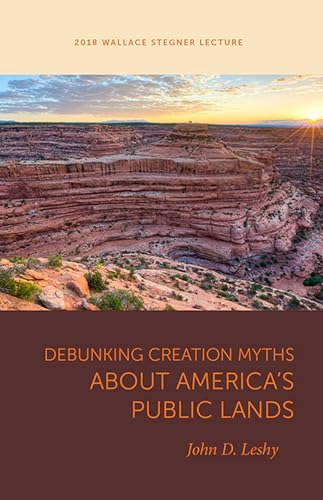Debunking Creation Myths about America's Public Lands (Wallace Stegner Lecture)
John D. Leshy
BOOK REVIEW

In the realm of environmental discourse, few topics ignite passions quite like America's public lands. Debunking Creation Myths about America's Public Lands by John D. Leshy takes a daring plunge into the murky waters of misconceptions, revealing profound truths that resonate not only within the ecological community but with every American. This is not merely a lecture; it's a clarion call to rethink how we view our precious landscapes, urging you to engage in a more informed conversation about land use, conservation, and the very essence of American identity.
Leshy, a prominent figure in issues surrounding public lands and former solicitor for the Department of the Interior, doesn't just scratch the surface. He digs deep into the fabric of myths that have been stitched into the narrative of America's natural spaces. The myths he targets are pervasive, echoing through the halls of politics and popular culture-distortions that reduce the complexities of land management into simplistic stereotypes and oversimplifications. Such narratives can lead to misinformed policies and, more critically, to a disconnection from the very nature we claim to cherish.
What sets this work apart is its brevity and laser-focus. At just 50 pages, it's a concise but potent weapon crafted to dismantle the falsehoods surrounding public lands. Leshy employs captivating rhetoric and an almost conversational tone to make complex legal and ecological insights accessible. You may find yourself nodding along, your assumptions challenged, and your perspective widening with each page turn. It's that engaging.
But what exactly are these "creation myths" Leshy exposes? One of the central themes is the notion that public lands are inherently detrimental to local economies, a claim often paraded by those who advocate for privatization. Yet, Leshy meticulously counters this argument, presenting evidence that shows how these lands can be - and already are - catalysts for economic growth through tourism, recreation, and conservation initiatives. The idea that public lands choke local opportunities collapses under the weight of factual analysis and real-world examples.
Readers have found themselves grappling with the shocking revelations in the text. While many laud Leshy's ability to distill complex ideas into digestible pieces, some critics argue that his points lack deeper exploration into the socio-political contexts that shape land use and conservation-an essential discussion in today's hyper-polarized climate. Shouldn't we, the public, engage with every facet of these land debates imperfectly layered over centuries? Skeptics challenge the book's assumptions, and it's essential to recognize these voices amidst the chorus. It's the discourse that propels societal growth.
Stepping outside the insular world of academia, Leshy's work reflects critical historical contexts that cannot be ignored. The policies shaping America's public lands were formed through intense battles that resonate with wider historical narratives-colonialism, indigenous rights, and the emergence of environmental movements. As you absorb the text, consider how these historical threads continue to inform our contemporary struggles. Leshy's exploration transcends a mere intellectual exercise; it demands action, accountability, and a re-envisioning of our relationship with nature.
Contrary to what you might think, this isn't just a textbook for environmentalists or policymakers. It's a rallying cry for all of us who traverse the canyons and forests of this vast nation. Whether you're a casual hiker or a committed activist, Leshy's insights pique a collective curiosity and foster a renewed commitment not only to understand but to cherish our natural heritage. You are invited to join a movement that not only protects but celebrates the dynamic and multifaceted nature of public lands.
As you close the book, something stirs within you. It's a feeling of urgency, an impetus to challenge the status quo, and to engage in the critical issues surrounding our public lands. This isn't merely about understanding myths; it's about embracing responsibilities. Are you ready to be part of the conversation that reshapes America's narrative on public lands? Leshy's work opens the door, but you must step through. The destiny of these sacred spaces hangs in the balance, and it's up to you to ensure their survival.
In this era of climate crisis and ever-shifting political landscapes, Debunking Creation Myths about America's Public Lands is an essential read, igniting a fierce urgency in the ongoing battle to protect our public resources. It's not just about the land; it's about who we are as a nation and what legacy we choose to leave behind. 🏞
📖 Debunking Creation Myths about America's Public Lands (Wallace Stegner Lecture)
✍ by John D. Leshy
🧾 50 pages
2018
#debunking #creation #myths #about #americas #public #lands #wallace #stegner #lecture #john #leshy #JohnDLeshy